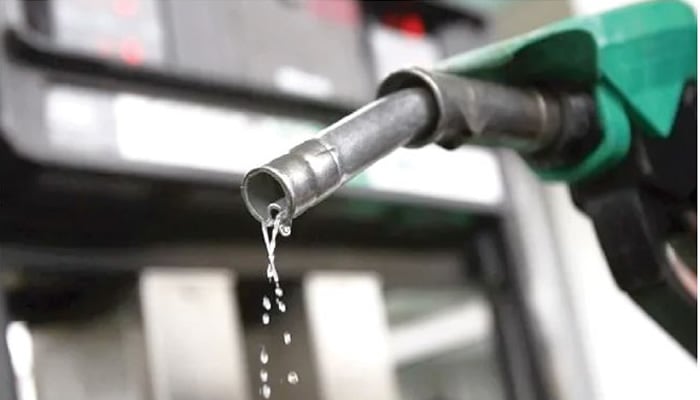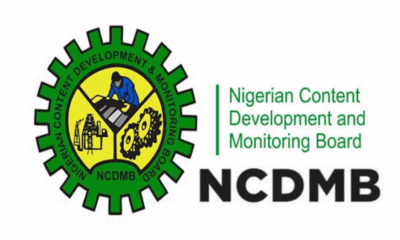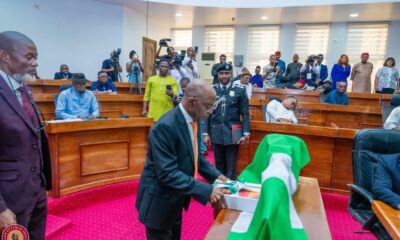Business
Petrol imports drop to eight-year low – Report

The importation of Premium Motor Spirit, popularly known as petrol, into Nigeria has dropped to an eight-year low in September, a new report has stated.
The sharp decline happened, as government reforms and expanding local refining capacity continue to redefine Nigeria’s downstream oil market.
A report by Argus on Monday disclosed that Nigeria received 116,000 barrels per day, equivalent to 18.44 million litres of petrol shipped by sea last month, down from 154,000 barrels per day (24.49 million litres) in August, the lowest on Kpler records that began in 2017.
The decline persisted even as operations at the country’s 650,000-barrel-per-day Dangote Refinery were slowed by ongoing maintenance and a recent industrial action by the Petroleum and Natural Gas Senior Staff Association of Nigeria.
This development came despite the Dangote Refinery carrying out maintenance on its gasoline-producing Residual Fluid Catalytic Cracking unit, experiencing brief union-related disruptions, and receiving limited crude oil supplies during the period.
The report read, “Nigerian gasoline imports in September again scraped at least eight-year lows, even with the country’s 650,000-barrel-per-day Dangote refinery undergoing maintenance and facing industrial action.
“The country received 116,000 barrels per day of seaborne gasoline last month, down from 154,000 barrels per day in August, the lowest on Kpler records that began in 2017.”
The report added that net gasoline imports slumped to a new low of 38,000 barrels per day in September, after cargoes were notably loaded from Dangote for New York Harbour.
Total gasoline loadings from Nigeria were their second-highest on record at 77,000 barrels per day.
It also reported that the Dangote’s RFCC was taken offline on September 2, according to market participants, and was due to return fully online in early October.
Towards the end of September, a dispute between the refinery and oil workers’ union PENGASSAN led to a two-day strike that disrupted natural gas and crude supply. This was resolved at the start of October.
Argus tracking showed 375,000 barrels per day of crude arrived in September, down from 440,000 barrels per day in August.
But no local gasoline supply shortages were reported in September, and gasoline asking prices at the Dangote refinery were broadly steady around N820 naira per litre.
The report added that the naira-denominated domestic gasoline sales were further bolstered by the resumption of the naira-for-crude programme, under which Dangote pays local currency for domestic crude grades sourced from state-owned NNPC and sells gasoline and diesel to the local market in naira.
A one-day suspension of naira gasoline sales by Dangote on September26 was “amicably resolved”, according to a finance ministry statement.
Dangote said Nigeria’s domestic petrol demand averaged 40 million litres per day, equivalent to 252,000 barrels daily in September.
It noted that global gasoline prices climbed during the month, partly due to the Dangote RFCC incident early in September, which affected regional supply. The benchmark non-oxygenated gasoline barge crack to ICE Brent crude surged to a 16-month high of $21.17 per barrel on September 17, driven by tighter supply fundamentals.
Data from global energy intelligence firm Kpler showed that Nigeria’s petrol imports dropped by more than 40 per cent to 162,000 barrels per day between January and September 2025, down from last year’s levels when the country ranked as the world’s fifth-largest petrol importer. Nigeria now occupies the eighth position globally, though it remains Europe’s largest gasoline buyer, albeit at nearly half of 2024 volumes.(Punch)
-

 Business22 hours ago
Business22 hours agoOil Industry Contracting: NCDMB Issues NCEC Guidance Notes, Rules Out Transfer of Certificate
-

 News22 hours ago
News22 hours agoKnocks For Tinubu For Attending Wedding Without Visiting Kwara Massacre Victims
-

 Politics22 hours ago
Politics22 hours agoMakinde, Wike camps set for showdown at PDP HQ today
-

 Business22 hours ago
Business22 hours ago‘Should have been sold before rehabilitation’ — Atiku asks NNPC to discontinue proposed refinery deal
-

 News22 hours ago
News22 hours agoElectoral Act standoff: Senate calls emergency plenary as protests loom
-

 News22 hours ago
News22 hours agoInsecurity: ADC Spokesman Taunts Tinubu, Says Nigeria Has No Gov’t
-

 News22 hours ago
News22 hours agoAbia blames typo after allocating N210m for photocopier in 2026 budget
-

 Politics22 hours ago
Politics22 hours agoElectoral Act: NLC Threatens Mass Action Over Senate’s Rejection Of Real-Time Transmission Of Results


















